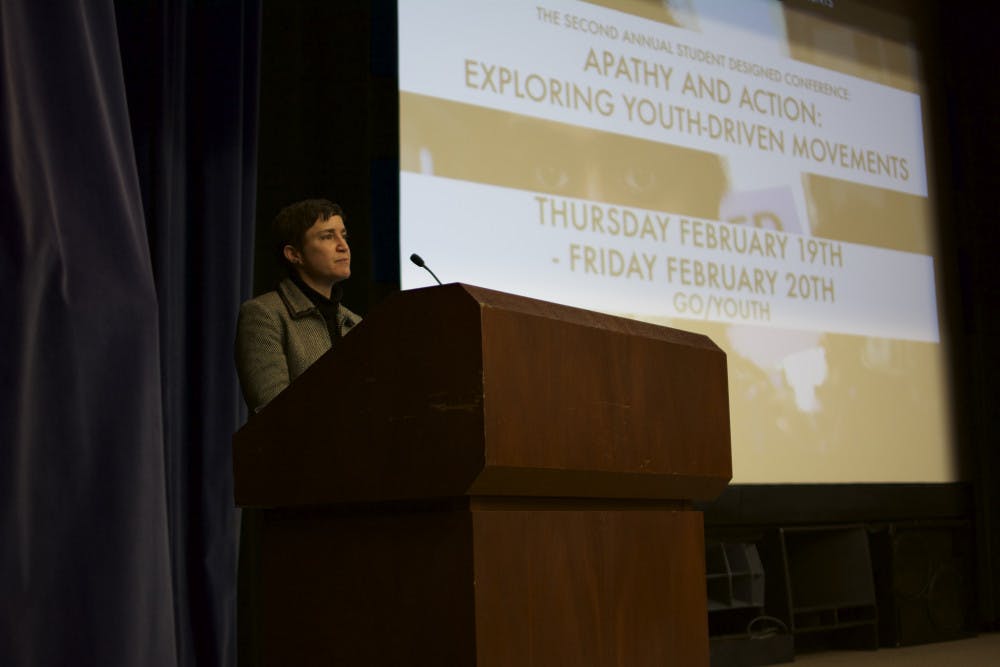The inception of the Rohatyn Center for Global Affair’s Student-Led Conference was only a little over a year ago, and yet this year’s “Apathy and Action: Exploring Youth-Driven Movements” conference had the appearance of being a long established event on campus. Last year’s conference, entitled “Immigration in the Neoliberal Age,” set a precedent for progressive and internationally-relevant themes, which continued into this year’s conference.
Seeking “to put the latest youth-led movements in perspective and look to the future, aiming to determine the key factors that will be responsible for either bringing or deterring social change,” according to the event’s online description, students Gabbie Santos ’17, Bilal Khan ’18, Forest Jarvis ’15 and Karen Liu ’15 applied to lead and organize this year’s conference. Members of the Rohatyn Student Advisory Board (RSAB) selected the “Apathy and Action” proposal and other than financial support, Santos, Khan, Jarvis and Liu have been entirely responsible for orchestrating the conference. Their months of hard work and commitment to exploring the topic of youth-led social action were evident at last week’s conference.
After two days of guest speakers, discussions and screenings, the event concluded on the evening of Feb. 20. The conference addressed pertinent topics that were divided into the following five sessions: “Between Protest and Powerlessness: The Startling Ubiquity of Student Activism”; “The Radical Mind”; “Combatting Apathy”; “Collective Action and Strategy”; and “The Climate Movement.”
Compelling guest speakers, such as Shannon Galpin, founder and director of Mountain2Mountain, Marcela Olivera, the Latin American coordinator for Water for All and Alexandra Barlowe, outreach coordinator for Fossil Free Yale, supplemented each of these sessions — some traveling from as far as Bolivia to attend. In addition to these speakers, Schumann Distinguished Scholar Bill McKibben and Associate Professor of Sociology Linus Owens also imparted important knowledge and incited meaningful conversation.
Attendance and engagement was impressive. The Rohatyn Center for Global Affairs (RCGA) Director Tamar Mayer found the event “very successful” and attributed some of the conference’s success to the thoughtful ordering of the discussions, “starting with an academic discussion about protest and radicalism and continuing with practitioners.”
Thinking back the organizers’ involvement in the planning process, Liu was initially drawn to their preliminary conversations.
“These were not just conversations, they were dialogues that we could translate into something larger — something that could engage the entire community and broaden the scope of participants,” Liu wrote in an email.
Santos also expressed a desire to have the conference act as a means to “engage the community in thinking about what our roles might be as youth, in the context of social movements, from the spectrum of apathy to action.”
Similarly, Jarvis expressed witnessing “a lot of high-profile student-led events and protests here [at Middlebury], which have been met with varying levels of success … it seems to be about finding a ‘happy medium’ between drawing people’s attention and getting people on campus to care about relevant issues and not being too divisive or aggressive about the movement.”
“If our students will move to organize around a topic, which is close to their hearts, and mobilize to bring change, this conference’s impact will last for a long, long time,” Mayer said. “Wouldn’t that be the ultimate success?”
With youth-driven activism sweeping the globe, it is likely that the success Mayer speaks of and the intention of the conference — to provide students with the opportunity to reflect on how to “affect and support change in the real world” — is well on its way to being realized.
Student Conference on Apathy and Action

Comments


